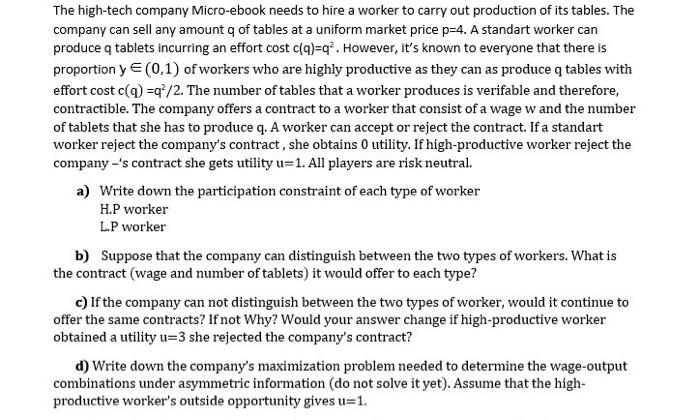please solve it mathematically by explaining
The high-tech company Micro-ebook needs to hire a worker to carry out production of its tables. The company can sell any amount q of tables at a uniform market price p-4. A standart worker can produce q tablets incurring an effort cost c(q)=q. However, it's known to everyone that there is proportion y = (0,1) of workers who are highly productive as they can as produce q tables with effort cost c(q) =q/2. The number of tables that a worker produces is verifable and therefore, contractible. The company offers a contract to a worker that consist of a wage w and the number of tablets that she has to produce q. A worker can accept or reject the contract. If a standart worker reject the company's contract, she obtains 0 utility. If high-productive worker reject the company's contract she gets utility u=1. All players are risk neutral. a) Write down the participation constraint of each type of worker H.P worker L.P worker b) Suppose that the company can distinguish between the two types of workers. What is the contract (wage and number of tablets) it would offer to each type? c) If the company can not distinguish between the two types of worker, would it continue to offer the same contracts? If not Why? Would your answer change if high-productive worker obtained a utility u=3 she rejected the company's contract? d) Write down the company's maximization problem needed to determine the wage-output combinations under asymmetric information (do not solve it yet). Assume that the high- productive worker's outside opportunity gives u=1. The high-tech company Micro-ebook needs to hire a worker to carry out production of its tables. The company can sell any amount q of tables at a uniform market price p-4. A standart worker can produce q tablets incurring an effort cost c(q)=q. However, it's known to everyone that there is proportion y = (0,1) of workers who are highly productive as they can as produce q tables with effort cost c(q) =q/2. The number of tables that a worker produces is verifable and therefore, contractible. The company offers a contract to a worker that consist of a wage w and the number of tablets that she has to produce q. A worker can accept or reject the contract. If a standart worker reject the company's contract, she obtains 0 utility. If high-productive worker reject the company's contract she gets utility u=1. All players are risk neutral. a) Write down the participation constraint of each type of worker H.P worker L.P worker b) Suppose that the company can distinguish between the two types of workers. What is the contract (wage and number of tablets) it would offer to each type? c) If the company can not distinguish between the two types of worker, would it continue to offer the same contracts? If not Why? Would your answer change if high-productive worker obtained a utility u=3 she rejected the company's contract? d) Write down the company's maximization problem needed to determine the wage-output combinations under asymmetric information (do not solve it yet). Assume that the high- productive worker's outside opportunity gives u=1







